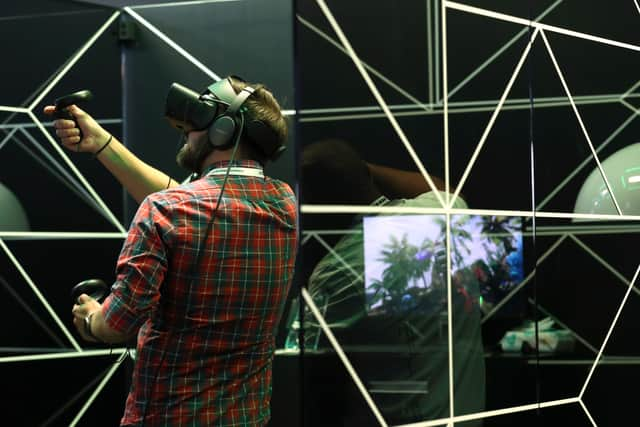Why did Facebook change its name to Meta? Mark Zuckerberg’s metaverse launch explained by tech experts
This article contains affiliate links. We may earn a small commission on items purchased through this article, but that does not affect our editorial judgement.
and live on Freeview channel 276
Facebook has announced that the name of their company has changed to Meta with the business taking its focus away from the traditional social media platform.
Alongside the name change, founder and CEO Mark Zuckerberg also revealed plans to pivot the company towards creating a ‘metaverse’ which will focus on the development of virtual reality products.
Advertisement
Hide AdAdvertisement
Hide AdBut what does this mean for the company and why have they decided to take these steps? We speak to industry experts about what this means for users and why Meta has decided to shift focus from its flagship social media platform.
Why did Facebook change its name to ‘Meta’?
Yesterday (28 October) saw Zuckerberg make the announcement that Facebook’s holding company will be changing its name to ‘Meta’ in a rebrand for the business.
One of the main reasons the tech entrepreneur gave for the name change was the fact that the name ‘Facebook’ no longer reflects the range of products the company now offers.
In his announcement, Zuckerberg said the pivot towards the ‘metaverse’ will see a move away from the traditional Facebook platform which currently hosts 2.9 billion active users, with the new ‘Meta’ branding reflecting this more accurately.
Advertisement
Hide AdAdvertisement
Hide AdAlthough the holding company will change its name, the social media platform will retain the name Facebook.
However, as the popularity of the traditional social media platform begins to decrease and user fatigue rises, many experts believe that the name change is part of an attempt by the company to relaunch the business following recent Facebook controversies.


Danny Stefanic, CEO and Founder of MootUp, a 3D metaverse virtual events platform, told NationalWorld that despite the controversies, the name change may mark a new era for content consumption online.
He said: “Amidst a string of recent controversies, Facebook’s decision to rename is being criticised.
Advertisement
Hide AdAdvertisement
Hide Ad“However, we should not overlook the symbolic implications of its name change to Meta. The announcement reflects the inevitable rise of the metaverse as the next disruptive iteration of the internet.”
What is a ‘metaverse’?
The term “metaverse” is already “widely used within the tech realm”, Stefanic says.
He adds: “Put simply, it describes the creation of shared, 3D virtual spaces that are linked to a virtual universe and access through different online tools.
“As society learns more about the concept and its practical uses, I anticipate interest and demand for metaverse applications will rise. Importantly, this is not limited to consumers – businesses and public organisations are also ideally positioned to benefit, using the metaverse to host events and conferences through to education and training simulations.”
Why has Facebook launched a ‘metaverse’ and what does it mean for the future?
Advertisement
Hide AdAdvertisement
Hide AdAs Zuckerberg stated in his address, the company will be moving towards more virtual reality based products to help support their ‘metaverse’.
In the conference, he said: “Building our social media apps will always be an important focus for us but right now our entire brand is so tightly linked to one product that it can’t possibly represent everything that we’re doing today, let alone in the future.
“Over time, I hope that we are seen as a metaverse company. And I want to anchor our work and our identity on what we’re building towards.”
A trial of the new virtual reality hangout process called ‘Horizon’ was previewed during the announcement, which Zuckerberg says will be able to be used for events such as work meetings and education spaces.
Advertisement
Hide AdAdvertisement
Hide AdThe company already produces virtual reality products such as those through Oculus and an expansion of this side of the business is expected to support Meta’s ‘metaverse’ in the future.


Danka Delic, digital privacy advocate at ProPrivacy, told NationalWorld: “The goal of this strategic rebranding is to create a shared digital space built over their existing products and services, consisting of virtual reality headsets and augmented reality.
“The scope of this may mean we interact with social media differently, where users will be able to step inside content instead of simply viewing it, and live their lives in an online space. As such, Oculus products might very well become a core pillar of this metaverse and impact the personal and professional lives of millions.”
However, Delic warns that the rise in ‘metaverse’ products on this scale may bring issues for users: “It is important to note that an innovation of this magnitude could potentially be dangerous, fast consuming peoples’ lives, and bring about even more privacy intrusions to the already fragile world of social media and data security.”
A message from the editor:
Advertisement
Hide AdAdvertisement
Hide AdThank you for reading. NationalWorld is a new national news brand, produced by a team of journalists, editors, video producers and designers who live and work across the UK. Find out more about who’s who in the team, and our editorial values. We want to start a community among our readers, so please follow us on Facebook, Twitter and Instagram, and keep the conversation going. You can also sign up to our email newsletters and get a curated selection of our best reads to your inbox every day.
Comment Guidelines
National World encourages reader discussion on our stories. User feedback, insights and back-and-forth exchanges add a rich layer of context to reporting. Please review our Community Guidelines before commenting.